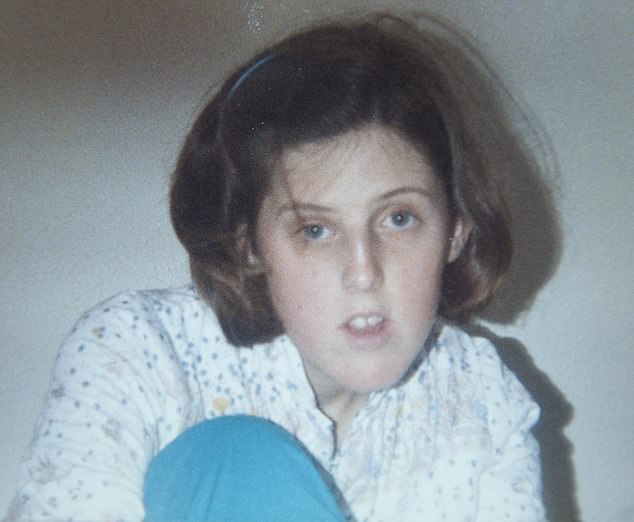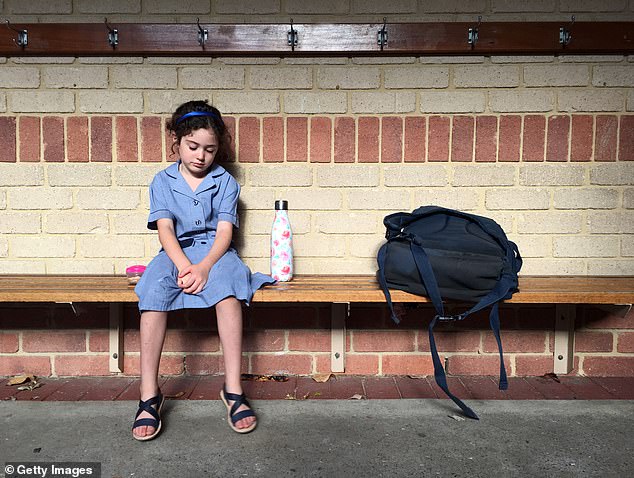She mocked my teeth, said I stank and humiliated me. But my reaction when I confronted the bully who tormented me 33 years ago shocked me…
At a school reunion I saw her before she saw me. At first I couldn’t believe it was her.
She was a nondescript middle-aged woman, a little plump. She was wearing a floral summer dress and sandals. I noticed that her ankles had that characteristic swelling that some obese women in their forties have.
But that’s just me being mean, still looking for reasons, after all these years, to take her down. To take her power away.
I wouldn’t have given her a second glance if we had passed each other on the street. Yet this was the girl – now grown up – who had made so much of my school life hell.
Shona Sibary (center) at her boarding school in the 1980s
I had spent 33 years rehearsing what I would say if I ever saw her again. Now here she was…and I couldn’t find the words. I didn’t know if I could forgive her. Can anyone really forgive their bully?
We went to a convent school together in Sussex. I went as a boarder in 1980 at the age of nine. Before that, my family had lived in Fiji for four years, where my father worked as a property developer, and the only schooling I knew was rather unconventional. There was no TV in Fiji in the late Seventies, so I devoured Enid Blyton books and dreamed of boarding school fun with midnight parties and freezing dormitories.
And when we moved back to the UK after a catastrophic flood, my parents were happy to do so.
I remember arriving that first Sunday night and my mother unpacking my things in the closet next to my single bed, and gently placing my stuffed animal on the pillow. “Hold on,” she said, hugging me tightly. “You’re going to have to find a way to fit in.”
She was right. Looking back, I see that I wasn’t aware that I had entered a world of unspoken rules and nuances. A world where if the coolest girl in school decided she didn’t like your appearance, that was it.
That first morning in the refectory I innocently snuck in and was assigned a seat at a table with – let’s call her Mandy. She was two years older and clearly the boss.
Buttered white toast was passed around, piled high on plates. I took a hot slice from the top and Mandy’s eyes narrowed. “Put that back, new girl,” she ordered. “You get the cold toast from the bottom.”
Shocked, I dropped my slice, causing her glass of juice to spill across the table and onto her skirt. She looked at me with such disdain that I shrank back in my seat.
And that was it. My fate was sealed in less than five minutes over a loaf of Mother’s Pride bread. From that day until the day she left, Mandy made it her mission in life to torment me. Her weapons of choice were words and super-clever mind games.

Shona, pictured eight years old, was bullied by a girl two years older than her
If I’m honest, I made it easy for her. I was a strong-willed girl with no filter. I had no siblings to beat that out of me, and I assumed everyone would like me. So far, they had, and this had given me the confidence—fatally—to be myself.
“You’re such a weirdo, aren’t you?” Mandy would say every day at breakfast, announcing it as if it were an indisputable fact. Of course, everyone agreed with her.
“Why don’t you do something about your crooked teeth? And what’s wrong with your eye?” (A birthmark had given me a squint as a baby, and I was blind in one eye.)
It was a daily, merciless punishment. It was easier for the other girls to sit back, say nothing, and let Mandy reign supreme. Why would they stick their heads above the parapet for a slightly annoying new girl Tiswas had never seen before?
A smarter girl would have hunkered down, made herself less visible. But I did the opposite, simply clinging to the belief that, if nothing else, I still had my mind (as I said, I had read a lot of Enid Blyton).
Mandy knew I wanted to be an actress, so one day she casually announced that her father was directing the new West End production of Annie, and that he had asked her to scout orphans for the show.
I remember thinking, “I’m sure your dad’s in the Navy,” but at the same time I was so desperate for the chance that I deliberately suspended my disbelief. And besides, all the other girls, who were into sports, confirmed that it was true.
Mandy herded everyone into the gym where there was a stage. Looking back, I still shudder at the way I stepped onto that stage, ignoring the warning voice in my head. I sang through Tomorrow and then, for good measure, Its The Hard Knock Life. She pretended to take notes as everyone chuckled.
When I finished, there was a moment of excited tension and anticipation, a bit like when a roller coaster reaches the top of its climb only to plummet to the abyss.
“You’re worthless,” Mandy said. “Don’t call us, we’ll call you.” And then everyone burst into hysterical laughter.
When I look back on that moment – perhaps one of the most humiliating moments of my life – I wonder why I never said anything or asked anyone for help. A lot of it had to do with self-preservation.

As an adult I feel angry at my younger self. I wasn’t a bad child, writes Shona (file image)
I didn’t see my parents for weeks and the nuns were distant. We were expected to stand on our two feet and carry on. But as an adult, I feel angry for my younger self. I wasn’t a bad kid. Annoying, yes, but I didn’t deserve Mandy’s campaign of cruelty.
This thought kept running through my mind 33 years later, at our reunion. There she was, suddenly, standing in front of me, holding her daughter’s hand.
I hated myself for wishing I had worn something more flattering. Then I noticed that her roots needed to be done. “Stop it,” a voice in my head admonished. “You’re a grown woman. You don’t have to do this.” Yet I was aware that I was rearranging my face, feigning nonchalance—a force of habit as my survival instincts kicked in.
“How have you been?” she asked. “A long time.” I nodded, still unable to speak. We walked together down a hallway so familiar to both of us, past a place where she had once screamed, holding her nose, telling everyone I had bad BO.
“I’m glad you’re here,” she said. “I think I was a bit of a bitch to you at school and I would hate for my daughter to go through the same thing.”
The girl looked up at me and smiled. She seemed nice. Not the kind of person who would ever tell a classmate that their face looked like something Bugs Bunny had thrown up on.
I took a deep breath. I doubted Mandy had lost any sleep over the years over the way she treated me at school. She just wanted to be free. Maybe motherhood had softened her.
“Look Mandy,” I said. “You really hurt me.” She seemed instantly shocked, and still a pleaser, I couldn’t help but take those words back.
“I’m so sorry,” she whispered. We stood in the same place we’d stood so many times before, eons ago. I thought of all the girls in the future who will stand here too—not real women yet, feeling their way.
Mandy was just a teenager, with a father in the military, and probably struggling with a lot of issues of her own. I took a deep breath and only then realized that after years of agonizing over what had happened, I finally didn’t care anymore.
“It’s okay,” I replied with a grin. “Let’s have a cup of tea.”
And despite everything, it was okay. I forgave her. I think my 11-year-old self would be proud. She was more resilient than I give her credit for today.
